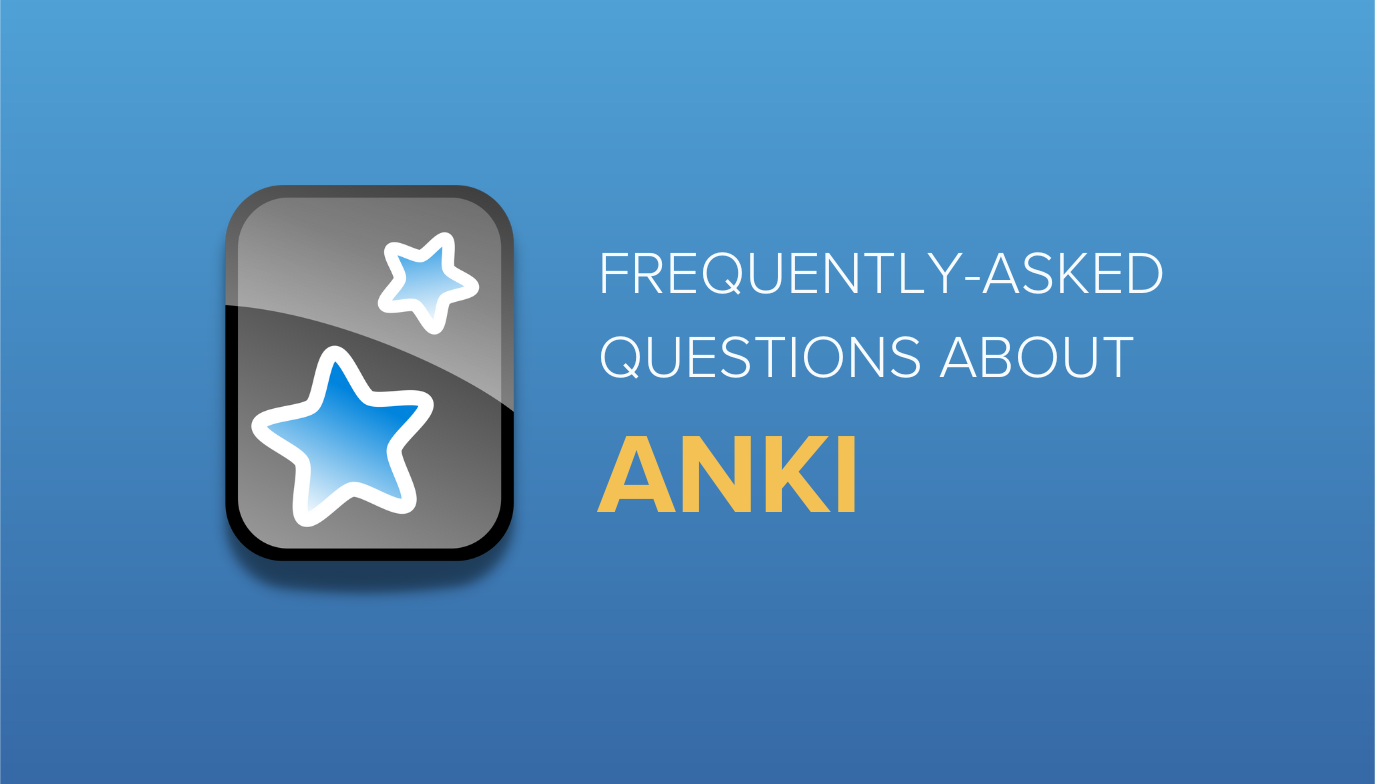Maybe you’ve read Blueprint articles about Anki cards like “What is Anki?” and “Which USMLE Subjects Are Best for Anki?” but still have questions about this popular study resource. If so, no worries—we’ve got you covered!
In this article we’ll go over some FAQs medical students have about Anki cards. I’ll show you how to get the full benefit of them and what research has been published that supports incorporating them into a comprehensive study plan.
We’ll also take a look at whether it makes sense to make your own cards, how often you should review them, and how much study time you should devote to Anki.
Let’s begin!
1. Should I make my own Anki cards?
An age-old question! I largely recommend against creating your own Anki cards. For medical students, there are several different kinds of decks you can download from the internet, all of which contain very good cards.
These decks rely on trusted resources such as First Aid, Pathoma, Sketchy, etc. (So far Blueprint just has flashcards for the MCAT, so get your pre-med friends started on the flashcard train early!)
It would eat up valuable study time (and equally important leisure time) to create your own cards based on these resources when they already exist.
2. Does it ever make sense to make my own Anki cards?
That said, there are a couple of situations where crafting your own deck is beneficial. The first is in cases where you want to supplement a deck.
For example, if you’re using an anatomy deck but need to review neck anatomy a bit more, simply add a few cards that target your knowledge gaps.
Another example is making Anki cards based on questions you miss in your Qbank. When you get a practice question wrong, you can create a quick Anki card to learn the concept you forgot and incorporate it into your regular deck, rather than repeatedly re-doing entire questions in your Qbank.
3. How much of my studying should be with Anki?
Anki is a great study tool, but it shouldn’t compromise 100% of your study time. As discussed in my other article about Anki strengths and weaknesses, some subjects like physiology or biostatistics require you to draw out concepts or calculations to fully understand the whole picture. It’s best to avoid using Anki in these situations.
Attending lectures, board prep videos, or reading the textbook should also comprise a bulk of your time—after all, you need to learn the concepts before you dive into the review.
Finally, the most important part of your studying will always be doing practice questions (the Blueprint Qbank is a great place to start). Practice questions force you to synthesize information, think through differentials, and critically apply the information you learn. It’s a type of learning several steps above the rote memorization of Anki.
Ultimately, think of flashcards as a foundation that helps you get to the larger goal of acing practice questions. Focusing on clinical vignettes will help you do well on your exams, but more importantly, it will prepare you for the wards and your day-to-day work as a physician.
Plus, those matters aside, studying with flashcards for more than three hours a day is really boring…if you concentrate too much of your studying in Anki World, you’re likely to experience diminishing returns due to loss of focus and the rote nature of the activity. As with all things medical school, you have to find the balance that works for you!
4. Do I need to do all my reviews every day?
Yes! Keep reading to learn about research studies focused on this very question. Briefly, completing your old card reviews every day will help you get the full benefit of spaced repetition.
If you keep up with your daily reviews, they should be manageable and completed in less than two hours. However, if you add too many new cards each day (always target less than 100) or you don’t stay on top of your reviews, then Anki will become overwhelming. Any study tool that overwhelms more than reassures is not worth it!
If you discover you’re not wired to do flashcards every day, don’t fret about it. Utilize other high-quality study methods, and you’ll do much better than if you force yourself to use a tool your brain isn’t built for.
If you find you’re someone who can use Anki every day, take a day off every few weeks to let yourself recharge! Enjoy Anki-free birthdays, family holidays, and test days.
During time off, please use the freeze tool! Using the freeze tool will pause your Anki so that reviews don’t accumulate on your rest day and make the next day doubly stressful by forcing you to play catch-up.
At the same time, taking off a few days a week means you won’t be using Anki to its fullest potential. But taking off a few days a month won’t meaningfully impact your progress, and the mental health benefits will be much more impactful.
5. Does Anki work?
Last but not least, what kind of physician would I be if I didn’t find you some evidence for my Anki claims? There isn’t a huge body of research for Anki specifically, but some isolated studies can shed light on its effectiveness.
Anki Research Studies
A 2015 article in “Perspectives on Medical Education” analyzed Step 1 test scores among students who used Anki as well as practice questions. While controlling for factors like test anxiety and MCAT scores, it found that “each additional 445 boards-style practice questions or 1700 unique Anki flashcards were associated with an additional point on Step 1.” Notably, while only a third to a half of students used flashcards, all students used practice questions.
A 2021 study in “Medical Science Educator” surveyed about 200 students on their Anki habits and Step 1 scores. They found that Anki users averaged 241 on Step 1 while those that didn’t use the tool averaged 235.
The study also emphasized that how students used Anki was important. After all, the benefit of Anki is completing the “review deck” of cards each day. Completion rates did matter in a statistically significant way—for example, those who reviewed all of the cards “sometimes” averaged 236 on Step 1, whereas those who reviewed “most of the time” or “always” averaged three points higher.
Interpreting the Data
There are a few major takeaways from the studies above. The first is that Anki has been shown to improve test scores (as well as lessen test anxiety) but the effect is stronger when Anki is used the way it was intended. This means doing all of your reviews daily in order to capture the full benefit of “spaced repetition.”
If you engage with Anki only occasionally and don’t use it to review previously learned material, it’s unlikely to benefit you. If you’re not someone who can dedicate daily time to flashcards, it’s best to use other highly effective methods like concept mapping and practice questions.
The other takeaway is that while many medical students do well without using Anki, none do well without practice questions. All of the students in these studies utilized Anki in addition to practice questions rather than in place of them.
In summary, Anki is a great tool if used in the right way as part of a study plan that incorporates lectures, practice questions, and—of course—rest and relaxation!
Final Thoughts
Hopefully, this post answered some questions you had about Anki cards. Anki cards should never replace things like Qbanks when you’re preparing for USMLEs, but if you feel like they may work for you as a supplemental tool, use the information in this post to up your study game. Best of luck on your exams, and don’t hesitate to reach out to the Blueprint tutors if you need additional help!





